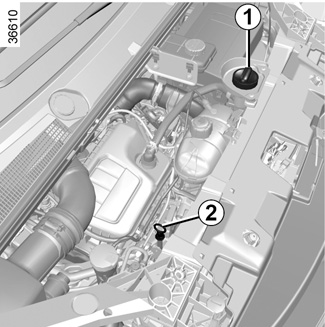ENGINE OIL LEVEL: topping up
Before performing any action in the engine compartment, the ignition must be switched off (please see the information on “Starting, stopping the engine” in Section 2).
Please note when working close to the engine that it may be hot. In addition, the engine cooling fan may start at any moment. The warning light in the engine compartment reminds you of this.
Risk of injury.
Filling: take care when topping up the oil that no oil drips onto engine components - risk of fire. Remember to refit the cap securely as there is a risk of fire if oil splashes onto hot engine components.
Never run the engine in an enclosed space as exhaust gases are poisonous.
When working in the engine compartment, ensure that the windscreen wiper stalk is in the park position.
Risk of injury.
Exceeding the maximum engine oil level
Under no circumstances must the maximum fill level be exceeded: risk of damage to the engine and catalytic converter.
If the oil level exceeds the maximum level, do not start your vehicle and contact an approved Dealer.

Topping up/filling
The vehicle must be parked on level ground and the engine should be cold (for instance, before the engine is started up for the first time in the day).
- Unscrew cap 1;
- top up the level (as a guide, the capacity between the minimum and maximum reading on the dipstick 2 is between 1.5 and 2 litres, depending on the engine);
- wait for approximately 10 minutes to allow the oil to flow into the engine;
- check the level using the dipstick 2 (as described above).
Once the operation has been completed, ensure that the dipstick is pushed in as far as it will go and that the cap is completely screwed in.
In order to prevent splashback, it is recommended that a funnel be used when topping up/filling with oil.
Do not exceed the max level and do not forget to refit cap 1 and dipstick 2.
Consult your approved dealer at once if you notice an abnormal or repeated drop in any of the fluid levels.